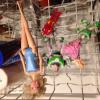Search the Community
Showing results for '"Weight gain"'.
Found 15,901 results
-
Some Dieters Are Set Up to Regain Weight Appetite Hormone Levels May Predict Dieters' Success By Denise Mann WebMD Health News Reviewed by Laura J. Martin, MD Sept. 9, 2010 -- Weight regain is the bane of many a dieter's existence. Often dieters who regain weight after losing it are viewed as failures and judged for their lack of willpower, but new research may put an end to this blame game. Weight regain may not be solely a willpower issue. Some people may actually be programmed to gain weight back based on their levels of two key appetite hormones, leptin and ghrelin. The new study appears in an online version of the Journal of Clinical Endocrinology & Metabolism. "This knowledge could be used as a tool to personalize weight-loss programs that could guarantee success in keeping off the weight," says study author Ana Crujeiras, PhD, of Compejo Hospitalario Universitario de Santiago in Spain, in a news release. Slideshow: Simple Secrets to Portion Control and Healthy Eating Setting Dieters Up to Win, Not Fail In the new study, 104 obese or overweight men and women ate a low-calorie diet for eight weeks and were followed up with six months later. Their body weight, ghrelin, leptin, and insulin levels were measured before, during, and after the diet. Ghrelin is the "go" hormone that tells you when to eat, and leptin is the "stop" hormone that tells you when to stop eating. On average, study participants dropped about 5% of their body weight while adhering to the low-calorie diet. Six months later, 55 people maintained their weight loss, while 49 regained 10% or more of the weight they had lost. Those individuals with higher leptin and lower ghrelin levels before dieting were more prone to regain weight, the study showed. While this may seem counter-intuitive based on the actions of these hormones, the researchers suggest that it may be a matter of some people being resistant to the effects of these hormones. Their brains may not be getting the fullness or satiety messages that these hormones are delivering. You may have a lot of leptin, but your brain is resistant to its effects; much like people with type 2 diabetes become resistant to the effects of the hormone insulin. Going forward, "these hormone levels could be proposed as biomarkers for predicting obesity-treatment outcomes," the researchers conclude. "Our findings may provide endocrinology and nutrition professionals a tool to identify individuals in need of specialized weight-loss programs that first target appetite hormone levels before beginning conventional dietary treatment." Fullness Resistance Syndrome Louis Aronne, MD, founder and director of the Comprehensive Weight Control Program at New York-Presbyterian Hospital/Weill Cornell Medical Center in New York, agrees. "There is something physical going on in people who regain weight," he says. "Resistance to these hormones is a risk factor for weight regain," he says. Aronne dubs this condition "fullness resistance" and says that your brain is resistant to signals that come from your stomach and intestines telling you that you are full and to stop eating. Fullness Resistance Syndrome continued... "With leptin resistance, you don’t feel full and the more you eat, the hungrier you may get," he says. "We need to stop blaming people and start recognizing the physical basis of weight regain and manage it so people do better," he says. The new research likely applies to significant numbers of people who are finding the battle of the bulge to be an uphill one. "We are getting down to some of the final choke points of our weight regulating system, and these should apply to large numbers of people," he says. Drugs aimed at leptin resistance -- and there are some in the pipeline -- may help, he says. 'Ample Evidence' "There's no question that most people who easily gain weight, and/or quickly regain weight after losing it are different from other folks," says Scott Kahan, MD, co-director of the George Washington University Weight Management Program in Washington, D.C., in an email. "The general public tends to think of 'fat' people as lazy and as having no willpower [but] it couldn't be further from the truth." "Ample evidence, now including this study, suggests that there are physiologic reasons for weight gain, difficulty at losing weight, and rapid weight regain after a diet," he says. "There is no question that certain people are preconditioned to gain weight more easily and more quickly regain weight after dieting, just as some people are predisposed to having their blood pressure spike after eating salt whereas others can eat all the salt they want without having problems with hypertension," Kahan says. "This study is another small step toward ultimately ... [devising] new strategies for weight management and disease prevention that work with our bodies' physiologic makeup, rather than against it." When I brought up the issue of grehlin and leptin with my former surgeon he just rolled his eyes - which is one of the many reasons he is my former surgeon. I believe that I have a problem with these hormones because it has always taken a lot of food to get me to the point of satiety and that whole "wait 20 minutes" after eating to get full never worked for me. Sometimes if I ever do achieve satiety AFTER eating it can take 90 minutes or more. That's IF. To achieve a satisfied feeling while eating would take way too much food.
-


medically supervised diet
rodriguezequal replied to bbabydoll's topic in Tell Your Weight Loss Surgery Story
A lot of times they do the supervised diet to make sure that you are willing and ready to make changes in your eating habits. I also have a thyroid condition and have been on meds for it for over 10 years now. A hypothyroid can also cause or at least help along weight gain and inability to lose weight. Good luck and I'm sure everything will go well. :eek: Take care. -


Did you keep surgery a secret? What did you tell people?
BayougirlMrsS replied to FinallyLosingIt20's topic in PRE-Operation Weight Loss Surgery Q&A
These 4 people are 3 too many and if you could get away with it, i would just tell that person that you're having hernia surgery (SX). I had Band SX in 2009 (232#) when WLS was still "taboo". I told my now ex husband, two sons, and two friends. I thought surely they could keep a secret...... NOPE. I was blindsided one day with..... Hey i heard you had WLS. I was like a deer in headlights. Then i had to fess up. When she (band) was removed in 2017 (143#) i made it no secret that it was gone. Fast forward.....2019 (173#) i decided to revise to the sleeve due to the weight gain (30#) and I had the money to do it (divorce settlement 14K). The only person that knows is my husband. Everyone was told i had Hernia SX, which was true. I did have a double hernia repair. I went in on 8/28/19 Wednesday and i was back at work on monday. by my wedding day 9/26/19, i was down 20lbs. People didn't think anything of the WL because they knew i was dieting for the wedding. Today I'm at 125-127. My weight has become a nonissue. KNOW THIS..... if you tell more than one..... it will get out. People will give you their "unsolicited" advice and or thoughts. You will get the .... Why? can't you lose it the "natural" way? I know a lot of people the SX didn't work WLS, you might die.... and the best one.... You don't weight enough for WLS..... Just a few to let you know. I love the fact that NO ONE knows this time... SO MUCH BETTER. -

Did you keep surgery a secret? What did you tell people?
BoredFatGirl replied to FinallyLosingIt20's topic in PRE-Operation Weight Loss Surgery Q&A
A close friend of mine had the surgery and told me.. She started sharing pictures of people who had gone through with it and how great they looked. She recommended that I see if I can get it done since I am always complaining about my weight. The process to get started went pretty smoothly and I was super excited about the whole thing.. Made a post on FB and shared the news with everyone on my weight loss and that I was going to get surgery.. I also shared that it was going to be postponed due to the pandemic and haven't updated anyone on my new date or even any weight loss/weight gain besides my husband now.. which is honestly what I wish I had did from the beginning. I know there is a lot of judgement behind getting surgery due to ignorance and have already heard a few negative responses to the news. I hate the idea of lying to friends/family, but may just say that I didn't go through with it and that I just started eating less and exercising more.. I don't know! -
To clarify, a piece of cake and ice cream will certainly not bust a diet or cause 5 lbs of fat gain. I've found that starchy/sugary carbs will make me hold more Fluid than consuming salt. And the good news is, the fluid tends to whoose away with extra liquid consumption and reducing the "bad" carbs. Notice I said "reducing" not eliminating? I do have a taste of them, they just aren't the main entree. When I did Atkins induction (several times) I couldn't even taste them without a weight gain (fluid), but within a day or two it would come right back off if I followed the plan. But it was still very discouraging. I lost so much fluid with my pre op and post op diet. My ankles that had been puffy (my sister, who's a nurse called it pitting edema) became bony. But as I began eating real food again some of it came back. I tend to be a person who has considerable fluctuation with fluid. My point was that sometimes it's hard to tell why our weight does these crazy ups and downs. And they are very discouraging. We just have to keep reminding ourselves of the big picture.
-


Revision from VSG to RNY
GreenTealael replied to CharlotteWebb's topic in Revision Weight Loss Surgery Forums (NEW!)
Hi! Question ( not judging promise just looking for clarification) Your food choices were Still plan perfect and you gained 60lbs? No medication interactions? Only reduced exercise caused weight gain? Thanks! Oh and speedy recovery 🎈 -
I think weight gain because of medication is something different than "the usual" regain so even if there were more veterans talking about this issue it might very well be that it's not helping you. However, maybe there are some veterans on this board who need to take similar meds and still maintain? Is there a chance that your meds can be reduced again in the future? There seem to be different strategies. I notice that several veterans talk about how they maintain their weight. It can usually be found in the threads about regain.
-


Sleep Apnea Testing?
momof3_angels replied to danielleleigh90's topic in PRE-Operation Weight Loss Surgery Q&A
Mine was done in a sleep lab. I wish it had been a home test! I really didn't fall asleep until just before I had to wake up. Fortunately in that 1 hour I did have severe sleep apnea.... but it was too late to put me on cpap for the titration so I had to go back and do it again. We are fairly certain that severe sleep apnea was probably the trigger for my rapid weight gain. I started years with of insomnia around the time I started gaining weight. Had no clue it was so bad. I still dont sleep all night every night... but it is so much better and now that I am loosing weight I feel so much better! Sent from my SM-G955U using BariatricPal mobile app -


The "bariatric Blues"
BLERDgirl replied to kymmiej11's topic in POST-Operation Weight Loss Surgery Q&A
Everything is normal. My motto is that just like you have to kiss a lot of frogs until you find your Prince, you have to try a lot of shakes until you find one that suits you. Buy single serving packs or samples whereever you can. Try RTD , powders , shots and liquid Proteins. Also try yogurts (I prefer Fage 0%,) or Kefir. Once you can get in your proteins and fluids your energy level will perk right up. In the mean time make sure you are taking your Vitamins and supplements. As for the weight gain, do not worry. I bet you haven't had a BM yet either. Either way, it's early days and your body is adjusting to major surgery and an entirely new eating program. Once it realizes that you are not starving or dying it will release the calories. -


Tired of this thing called 'THE STALL'
Indymom replied to RuthiieBabiie's topic in POST-Operation Weight Loss Surgery Q&A
What are you eating? Are you tracking your food? The weight gain might be from upping your Water and you may lose that very quickly. If your diet is carb-heavy, you might try upping your Protein and reducing your carbs. I would recommend tracking everything that goes into your mouth so you can see exactly how many calories you're eating (and what the mix of protein, carbs and fat is). Good luck, I'm sure it's frustrating! -
Jody, I hate the temporary weight gain from the TOM, but since I usually drop 3-5 pounds after, it always works out in the end! You're doing great, keep up the good work!!!:scared2::thumbup::thumbup: I got another Couch to 5K session in tonight. Have a great night everyone!!!
-


Has Anyone Had Successful Ivf With Lap Band?
Sara I replied to Kekebefree's topic in Pregnancy with Weight Loss Surgery
I had my lap band put in on June 12 th. It was a long process. I finally decided to pursue it after being rejected by a fertility clinic due to my weight which at the time was around 150 and because I was 40. I started going through the process of getting the surgery authorized when I decided to get a second opinion from another fertility clinic. They were willing to work with us. I am using my younger sister's eggs. Thank you sister! Any way because I was fearful of failure of either procedure failing I went through the process of both without informing one of the other until I knew for sure. I had to go through several appeals and hoops to get the lap band approved and as luck would have it they both were coming to fruition in June. So it was time for disclosure and Decisions. I went first to the lapband team at park nicollet in mn. I had had a very brief conversation with a nutritionist ptior to my second opinion and eas somewhat hopeful. The response from the surgeon once ascertaining my reasonings for waiting was that life is complicated, that the main concerns with bariatric and pregnancy is directed at nutrition. My surgeon noted minimal nutritional issues with the band, that the females bodies put needed nutrition to the baby first, and that people in poverty have healthy births. also noted was the majority of healthy births to women with lap bands. It was also pointed out that with the band that less weight gain during pregnancy the healthier. The fertility doc didn't care as long as the surgeon stayed away from my pelvic area. So. Surgery was completed and I am feeling geat and in about 7 days I will ( hopefully) have my Ivf implantation. I wanted to share my story to give a different experience or prompt new conversations with your treatment team. I wish you the best. Sorry for the length of this. I just ran across this site and was so excited. -


6 weeks post op ZERO WEIGHT LOSS AND DEPRESSED
ShoppGirl replied to crazycatladycanada's topic in Gastric Sleeve Surgery Forums
I don’t think the stomach they remove really weighs much. I didn’t lose any weight in the hospital. It’s possible that you were slightly dehydrated and lost more water weight in the beginning since you didn’t spend as much time at the hospital hooked up to fluids. Then when you got rehydrated your weight loss that week didn’t show because you added fluid weight?? There are honestly soooo many factors when you just went through major surgery that could cause weight gain or loss. It’s best to not even weigh yourself for the first few weeks. I would just look at the overall if I were you rather than trying to account for every pound because for six weeks out you are going great. -


What Does An Ulcer Vs A Slip Feel Like?
proshooperLinda replied to marfar7's topic in LAP-BAND Surgery Forums
When my reflux was VERY BAD my coughing was also as my throat was irritated by the acid. Nexium doesn't sound like it's working. As far as the ER they are usually staffed by NEWer doctors - just out of school so they actually tend to have more current info than most other doctors. I was sent in for an upper GI to a hospital that does NO bariactic surgery and they were looking at my band and found what my problem.was...Granted I'd have been more happy at the hospital that did the surgery but I was equally happy now knowing I can trust this place if need be. Please don't let the fear of weight gain stop you from seeking help. Hopefully this is only a small speed bump on your journey. Better to live well than die skinny! Don't let it get that serious! Yes, I do mean to scare you - but only because I care! Good luck.... Linda (PS - I would go back to a liquid diet for now because all the throwing up causes swelling which then makes the band tighter - worrying about band erosion and band slippage to a lesser degree...actually more concerned about band twisting as that can cause the problems you're having. I just had fluid taken out as this week after a band-fill a month ago progressively was causing more pain. throwing up and swelling...now I feel human again and it took 1.5 cc's out..and I lost 3 bs. after it was taken out!) -
Having the same issue with weight gain while working from home during COVID. I don't think we'll be going back to the office any time soon so I need to figure this out. I know I'm eating out of boredom and not exercising enough. I feel like there's nowhere I should be going because of COVID so trying to stay at home as much as possible. SO BORING! I'm 3 years out from VSG and up 15 pounds. Need to get it under control now.
-
From my own experiences, I know that if I eat carbs from candy or fruit I tend to hold or gain weight and experience sugar cravings. If the same amount of carbs come from beans/vegetables I don't experience weight gain and I don't get sugar cravings. The guidelines I was given said try to have 75% Protein 25% carbs per meal. And by carbs they were referring to fibrous vegetables like greens/beans/squash/eggplant - nothing that could be quickly converted into sugar like fruit or potatoes or Pasta or rice.
-
@Jessless great work on the one pound. It all adds up over time. Additionally getting the snacks out of the house always helps! It sounds like you know what the issue is. I had a poop ton of weight gain and I am now down 13 pounds. I’m over the moon. It has been S L O W and steady but I went back to protein first, not drinking with meals, cutting out crappy food, and exercising 4 days a week. We’ve got this. Keep at it and be patient with results.
-


Goals, Rewards ... How are you staying motivated?
Frangipani replied to Candle's topic in LAP-BAND Surgery Forums
I have found this Band to be a self-motivating tool. I am a professional dieter. Basically, I have gone on a major diet every year since my drastic weight gain about 12 years ago. I have managed to lose countless number of pounds over the years, and have dieted myself down to as low as a size 4. Unfortunately every time I dieted, all the weight would go back on plus more. In 2006 I became so discouraged that I just gave up, and in 2007 my weight reached an all-time high. All I was really missing was a tool that would guarantee me long-term success. Once it became apparent to me that this Band was actually going to work (which was after my first fill), I became highly motivated and have stayed that way ever since. As far as the exercise, well... I really can't explain it, but I absolutely love it now. I have no idea what caused this or how it happened, but I am totally hooked on working out, so motivation is not much of an issue for me at this point in time. A rather simple story, but there it is................... Crazy Ates January Exercise Challenge 2/30 Exercise Sessions Banded 8/07/07 Dr. Miguel Zapata, Monterrey Mexico -


What am i doing wrong?
NothingUpMySleeve replied to Sabredy12's topic in POST-Operation Weight Loss Surgery Q&A
My overall trend is downward, but I have gained on some days. I don't know how, because it's hard to gain on 500 cal a day, but I'm assuming it's just a Water retention thing and not true weight gain. That said, I'm 17 days post op and I've only lost 5lb, so I'm probably not the best example. -
hi thought id say hi,well ive been banded nearly7 years and struggled always ,losing weight gaining all back etc,never felt full just if something was stuck etc,i finaly 8 days ago got my band filled 10 cc sand yes all be it tight i know for me its something i need to lose the weight as before just wasnt working,also lost 7lbs so far so fingers crossed it will continue!! ps where are you located as im in the uk and can def recommends gateway health louise king does the fills etc for £100 a time,let me know how you get on,dont leave it as long as me hun,good luck ,x
-


What causes weight gain after sleeve surgery?
LightlyMyDarling posted a topic in Gastric Sleeve Surgery Forums
Is weight gain caused by mindless snacking and grazing? Drinking milkshakes all day long? I haven't had my surgery yet, but I'm curious how weight gain happens a year or two after the surgery "honeymoon" period is over. If you're stomach is still small, with just a bit of stretching, even if eating "slider" foods how can weight gain be significant unless you're consciously trying to eat, eat, eat all the time? I think most of us gained weight by doing just that, but isn't it harder to snack all the time after the sleeve? Any thoughts would be appreciated! -


Any October surgeries out there...
angiep3880 replied to debbiedenise's topic in PRE-Operation Weight Loss Surgery Q&A
Hey kkelly what did your gyno say about your bc. Idk what I'm gonna do. Can't take the pill anymore after surgery. I've tried the ring hated it. Can't get the shot cuz it causes weight gain. I can't get my tubes tied cuz I work for a catholic hosp and they won't pay for it and I can't afford it help!! -


5 years and it is never too late
playlikeworldchamps replied to playlikeworldchamps's topic in WLS Veteran's Forum
I started this thread 11 months ago. I am back to report that in May of last year I started gradually falling off my wagon mostly due to the expectations of others and because so many (not here but in real life) mocked my WOL and guilted me and I fell for it. My own fault but it is hard to stay strong and put self first. When you fall off besides weight gain I find that I get depressed eating carbs and sugar and am just not happy at all! It is like a deep dark hole that you don’t know how to get out of it and the vortex of eating for comfort and carbs just keep sucking you in. I gained about 25 back of the 35 I had lost last spring. I am re reading what I wrote above to get myself back on track with baby steps. I never read some of these comments before so will comment now that I never had experience with met forum as was never diabetic (though close). When I am a carb eater I do get shakes and ravenous however and “need” a fix or feel nauseous. I did not want to advertise my “failure” but decided to do so to let anyone reading to feel they are not alone if they also struggle. Only seeing success stories can be depressing when you are struggling so wanted to let everyone to know to keep fighting the good fight and never give up! -


THE SLOW LOSERS CLUB SUPPORT THREAD
Serengirl replied to Serengirl's topic in Gastric Sleeve Surgery Forums
https://www.viome.com/blog/microbiome-and-weight-gain-everything-we-know-so-far https://www.bbc.com/future/article/20190212-could-gut-bacteria-microbes-make-you-fat Some bacteria we get from our diet could indirectly cause weight gain by changing the gut’s behaviour https://www.scientificamerican.com/article/6-years-after-the-biggest-loser-metabolism-is-slower-and-weight-is-back-up/ -
Hi! So I received the RNY gastric bypass on September 23, and just got home out the the hospital yesterday. 11 days in the hospital. I'm in a crazy amount of pain and it's really hard to do simple things like getting out of bed and going to the bathroom. My surgery journey isn't at all what I had planned. What happened was after the first surgery, on the 23, I was throwing up, weak, and other gross things. The doctors checked on me every few minutes because they were worried they were going to lose me. So they rushed me to a different hospital for surgery number 2 to fix the problem found in the c t scan. They said I was born with an abnormally shapened stomach and it has always been larger, and that the weight gain my entire life hasn't been my fault and it was a medical issue! If I hadn't of gotten the surgery they said my stomach would have crushed my spleen. So the second surgery gave me a Omega Loop to help alter routing of my insides. So many things are horrible and went wrong, and I'm really starting to think this was the wrong thing for me. I'm eighteen, and this has been an abnormally amount of anxiety in my life. I have to drop out of classes this semester and quit my job to focus complete on healing. I just needed to share my story so far and look for some encouragement. Also, I'm hungry, is that normal? I'm worried that this didn't work. I eat my puréed food plan me always feel hunger after and like I can eat more. Advice?











